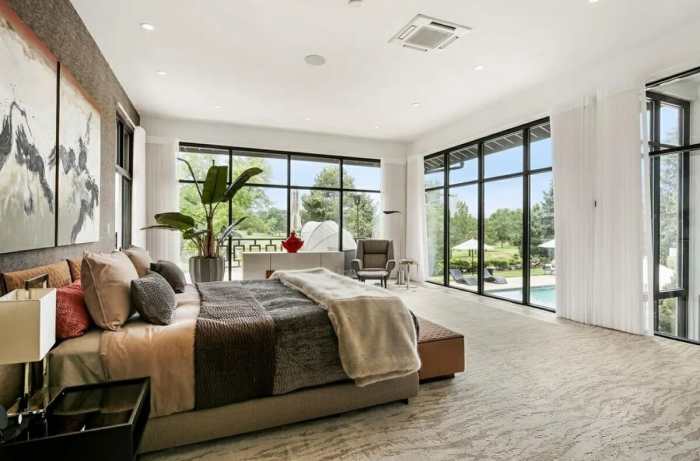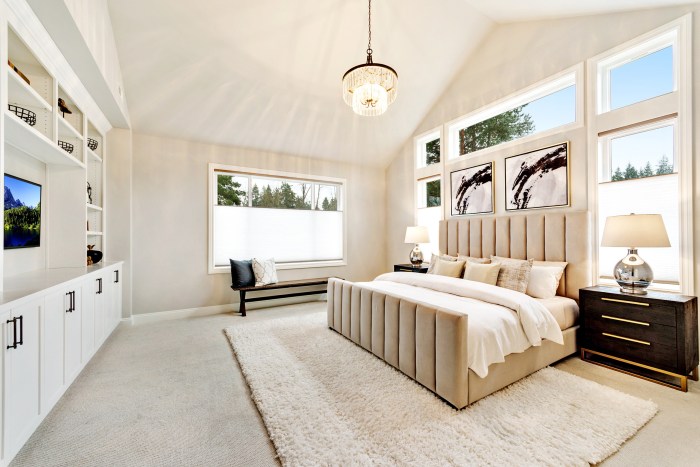Visual Impact of High Ceilings

High ceiling bedroom design – High ceilings in bedrooms significantly impact the overall feel and functionality of the space. They create a sense of grandeur and openness, influencing not only the aesthetic but also the psychological well-being of the occupants. The interplay of height, light, and architectural style contributes to a unique and personalized atmosphere.High ceilings dramatically alter the perception of space and scale within a bedroom.
Lower ceilings, typically found in older or smaller homes, can feel cramped and confining. In contrast, the increased vertical space provided by high ceilings creates a sense of spaciousness and airiness, making the room feel larger and more expansive than its actual square footage might suggest. This effect is amplified by the increased volume of air, contributing to a feeling of freedom and less claustrophobia.
The psychological impact is considerable; high ceilings can promote feelings of calm, serenity, and even luxury, depending on the overall design.
Lighting Design and High Ceilings, High ceiling bedroom design
Effective lighting is crucial to maximizing the visual impact of high ceilings. Simply installing a central fixture can leave the space feeling unbalanced and underlit. Instead, a layered lighting approach is recommended, incorporating various light sources at different heights. This might include recessed lighting to provide general illumination, wall sconces to add ambient light and highlight architectural details, and statement pendant lights or chandeliers to draw the eye upwards and emphasize the verticality of the space.
High ceiling bedroom designs offer a sense of spaciousness and grandeur, significantly impacting the overall feel of a room. This is especially important when considering the design of your home, such as when planning a 2 bedroom house design , where maximizing the impact of each space is key. Therefore, thoughtful consideration of ceiling height is crucial for a comfortable and visually appealing bedroom within a smaller footprint.
Using dimmer switches allows for adjusting the brightness and creating different moods, from bright and airy to intimate and cozy. For example, a bedroom with 12-foot ceilings might benefit from recessed lighting throughout, complemented by bedside sconces for reading and a dramatic chandelier as a focal point above a dressing table. This multi-layered approach ensures even illumination and prevents the high ceiling from feeling cavernous or overwhelming.
Architectural Styles and High Ceilings
Various architectural styles are characterized by their use of high ceilings, each contributing a unique aesthetic to the bedroom design. The ceiling height directly impacts the overall style and the types of decor that complement it.
| Style | Typical Ceiling Height | Visual Impact | Suitable Bedroom Decor |
|---|---|---|---|
| Victorian | 10-14 feet | Ornate, detailed, opulent | Antique furniture, rich fabrics, ornate moldings, heavy draperies |
| Georgian | 9-12 feet | Formal, symmetrical, elegant | Classic furniture, neutral color palettes, crown molding, simple draperies |
| Modern | 9-12 feet or higher | Clean lines, minimalist, spacious | Sleek furniture, neutral or bold colors, minimal ornamentation, modern lighting |
| Mediterranean | Variable, often high with exposed beams | Warm, rustic, inviting | Wrought iron furniture, terracotta accents, natural materials, textured fabrics |
Design Strategies for High Ceiling Bedrooms

High ceilings offer a unique opportunity to create a truly spectacular and personalized bedroom. However, simply having height isn’t enough; thoughtful design is crucial to maximizing the potential of this architectural feature and preventing the space from feeling cavernous or disproportionate. Effective strategies focus on creating a sense of balance and visual harmony, drawing the eye upwards and integrating the vertical space seamlessly into the overall aesthetic.
Utilizing Vertical Space in High-Ceiling Bedrooms
Maximizing the vertical space in a high-ceiling bedroom involves strategically incorporating elements that draw the eye upward and create a sense of grandeur without sacrificing comfort or functionality. This can be achieved through various design choices, carefully considering the interplay of furniture placement, lighting, and decorative features. A layered approach, combining different design elements at varying heights, is often the most effective strategy.
Accentuating Height with Vertical Lines and Textures
Vertical lines are powerful tools for emphasizing height. Tall, slender furniture pieces, such as floor-to-ceiling bookshelves or a striking, full-length mirror, can visually extend the vertical dimension. Similarly, vertical stripes in wallpaper or fabric choices can subtly elongate the walls. Textured elements also play a significant role; consider using vertical paneling, a textured wall covering with a vertical pattern, or even a series of vertically oriented framed artworks to create a visually interesting and height-enhancing focal point.
The contrast in texture can further accentuate the vertical lines, making the ceiling appear even higher.
Impact of Color Palettes on Space Perception
The choice of color palette significantly influences the perception of space. Lighter colors, particularly on the walls and ceiling, tend to make a room feel more spacious and airy, visually expanding the vertical dimension. A monochromatic scheme, utilizing varying shades of a single color, can create a sense of calm and elegance, while also drawing the eye upwards.
Conversely, darker colors can be used strategically as accents, such as on a feature wall or through the use of dark wood furniture, to create contrast and visual interest without making the room feel cramped. The key is to maintain a balance, avoiding overwhelming the space with overly dark tones.
Bedroom Layout and Furniture Placement
Effective furniture placement is crucial for utilizing the height effectively and creating a functional yet aesthetically pleasing bedroom. Avoid cluttering the floor space; instead, opt for taller, more slender furniture pieces.
- Four-poster bed: A four-poster bed, especially one with tall drapes, draws the eye upwards and creates a sense of intimacy and grandeur. It anchors the space while acknowledging the verticality of the room.
- Tall bookshelves or storage units: Floor-to-ceiling shelving units provide ample storage while also creating a visually appealing vertical element. They can be placed along a wall to maximize space and add architectural interest.
- High-hanging pendant light: A statement pendant light fixture hung at a higher point adds a touch of elegance and draws attention to the ceiling height. It can serve as a focal point, enhancing the overall design.
- Floor-length curtains: Floor-to-ceiling curtains create a sense of verticality and can be used to add color and texture to the room. They soften the hard lines of the architecture and enhance the sense of space.
FAQ Explained: High Ceiling Bedroom Design
What are some common mistakes to avoid when designing a high-ceiling bedroom?
Common mistakes include neglecting vertical space, using furniture that’s too small, and failing to adequately layer lighting. Avoid overwhelming the space with too much furniture or using a color palette that makes the room feel cramped.
How can I make a high-ceiling bedroom feel cozier?
Use warm color palettes, incorporate textiles like rugs and curtains, and layer lighting to create a more intimate ambiance. Consider adding a large statement rug to anchor the furniture and define the space.
What are some budget-friendly ways to enhance a high-ceiling bedroom?
Strategic painting, using affordable textiles, and DIY projects like adding shelves or installing affordable lighting fixtures can significantly improve the space without breaking the bank. Consider repurposing existing furniture or finding affordable alternatives.
